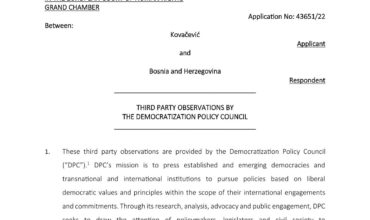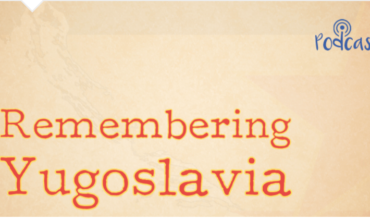Latest blog post
Europe Must Build Alliance to Counter Hostile US
The new US National Security Strategy closes the book on values-based comprehensive security and promises disruption to democratic governance everywhere. It’s time for Europe to consolidate a democratic “Europe Plus” by developing strategies to counter the threat that its erstwhile ally has become.
Our Mission
DPC’s mission is to press established and emerging democracies and transnational and international institutions to pursue policies based on liberal democratic values and principles within the scope of their international engagements and commitments. Through its research, analysis, advocacy and public engagement, DPC seeks to draw the attention of policymakers, legislators and civil society to encroachments on freedoms within the democratic framework.
News
DPC Third Party Intervention ECHR case Kovačević v. Bosnia and Herzegovina
DPC, concerned by the High Representative’s reported arguments in favor of a partial revision of the Kovacevic decision by the European Court of Human Rights in his submission to the Court, worked with Axiom Advocates (Edinburgh) to submit a third-party intervention to the Court in the Kovacevic v. Bosnia and Herzegovina case. Ahead of a scheduled ECHR session and not having received any decision on admissibility of our intervention, we decided to make it public.
DPC at the 2024 Budapest Balkans Forum
DPC’s Kurt Bassuener and Valery Perry attended the Budapest Balkans Forum (March 12-13), participating in plenary and breakout sessions, and getting a view of the view of Hungary’s priorities in the region. In her blog on the event, Valery Perry writes that year’s Budapest Balkan Forum provided a clear view[…]
CultureReady Interview: Valery Perry
Valery Perry discusses conflict resolution, extremisms and work in the Western Balkans with Shabnam Ahmed. Listen to the podcast or read the transcript here.
Podcast discussion – the Specter of Dayton
Valery Perry joins Aida Hozić and Tanja Topić to speak with Peter Korchnak about the legacy of Dayton 26 years later. Listen to the podcast or read the transcript.
Divided schooling in BiH – a podcast discussion
Valery Perry joins Samir Beharić and Téa Hadžiristić to talk with Peter Korchnak about the policy of divided and segregated education in BiH; listen to the podcast or read the transcript.
Open Letter to EU, US, NATO
In this open letter, catalyzed by the Helsinki Committee for Human Rights in Serbia in cooperation with DPC and other organizations and individuals throughout the region, over 250 signatories call on EU, US and NATO representatives and their governments to confront the deterrence failure that has created an environment in[…]
Study: State Capture in the Western Balkans
The Democratization Policy Council and Eurothink are pleased to share our report, Sell Out, Tune Out, Get Out, or Freak Out? Understanding Corruption, State Capture, Radicalization, Pacification, Resilience, and Emigration in Bosnia and Herzegovina and North Macedonia. The full volume is available, and also a stand-alone Executive Summary and Recommendations.
This report was based on field work in 2020 with over 200 people, beginning just before the pandemic, and in the summer after the strict lockdowns lifted. Extensive media reviews were conducted for each country, and an online poll. In light of the difficulty in doing field work during COVID-19, this report provides an important overview of the situation in the two countries, from the ground up.
This report is a hybrid: Grounded in academic questions and literature, it strongly reflects the voices of ordinary people in localities that are often ignored in political discussions. In addition to the presentation of data, a set of 18 community snapshots is included to provide a deeper look at the lived impact of a generation of upheaval and stagnation. It also seeks to contribute to theory-building and in turn policy-making, as the issues of polarization, corruption, migration, opportunity, dignity, solidarity and vision were themes encountered and synthesized.
The DPC and Eurothink teams hope that this work will contribute to discussions on all of the themes explored. Most importantly, the report is a reminder of the impact on communities and on people of the radical social changes of the past three decades – changes to which consolidated democracies are themselves not immune.











